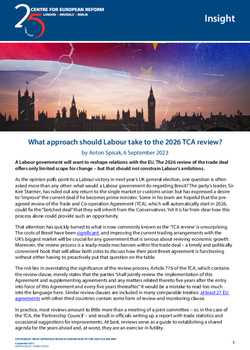
What approach should Labour take to the 2026 TCA review?
A Labour government will want to reshape relations with the EU. The 2026 review of the trade deal offers only limited scope for change – but that should not constrain Labour’s ambitions.
As the opinion polls point to a Labour victory in next year’s UK general election, one question is often asked more than any other: what would a Labour government do regarding Brexit? The party’s leader, Sir Keir Starmer, has ruled out any return to the single market or customs union but has expressed a desire to “improve” the current deal if he becomes prime minister. Some in his team are hopeful that the pre-agreed review of the Trade and Co-operation Agreement (TCA), which will automatically start in 2026, could fix the “botched deal” that they will inherit from the Conservatives. Yet it is far from clear how this process alone could provide such an opportunity.
That attention has quickly turned to what is now commonly known as the ‘TCA review’ is unsurprising. The costs of Brexit have been significant, and improving the current trading arrangements with the UK’s biggest market will be crucial for any government that is serious about reviving economic growth. Moreover, the review process is a ready-made mechanism within the trade deal – a timely and politically convenient hook that will allow both sides to discuss how their post-Brexit agreement is functioning without either having to proactively put that question on the table.
The costs of Brexit have been significant, and improving the current trading arrangements with the UK’s biggest market will be crucial for any government that is serious about reviving economic growth.
The risk lies in overstating the significance of the review process. Article 776 of the TCA, which contains the review clause, merely states that the parties “shall jointly review the implementation of this Agreement and supplementing agreements and any matters related thereto five years after the entry into force of this Agreement and every five years thereafter.” It would be a mistake to read too much into the language here. Similar review clauses are included in many comparable treaties: at least 27 EU agreements with other third countries contain some form of review and monitoring clause.
In practice, most reviews amount to little more than a meeting of a joint committee – or, in the case of the TCA, the ‘Partnership Council’ – and result in officials writing up a report with trade statistics and occasional suggestions for improvements. At best, reviews serve as a guide to establishing a shared agenda for the years ahead and, at worst, they are an exercise in futility.
EU officials have made it clear that the review process will be about a review of the implementation of the agreement rather than a review of the treaty itself, in line with what the treaty text says. Maroš Šefčovič, the vice-president of the European Commission who oversees UK relations, has said that the TCA had not been used to its “full potential” but warned that the review “does not constitute a commitment to reopen the TCA or to renegotiate the supplementary agreements”. Another EU official was adamant that the process is “a review, not a revision, not a renewal or even amendment of any sort”. The EU has a clear position on what to expect from the review: not very much.
What might the EU and the UK discuss about the TCA’s ‘implementation’? There are two types of issue. The first concerns questions that the two sides had decided to put on hold during the TCA talks and agreed to sort out later. The most obvious issue here – and for now – is the ongoing negotiation over the UK’s participation in EU programmes, such as the Horizon research programme, the Euratom research programme and the Copernicus satellite system. Progress could also be made in the area of energy, where the two sides have not agreed on the electricity trading arrangements that could ease cross-border flows across interconnectors; these were envisaged in the agreement but have not been implemented.
The second category concerns issues where the TCA offers possibilities for increased co-operation, but both sides have yet to take advantage of them. The agreement, for example, includes the possibility of merging the UK and EU emissions trading systems or negotiating the mutual recognition of qualifications for some regulated professions such as lawyers and architects. But most are not headline-grabbing issues; they involve the quieter but no less important work of numerous working groups focused on technical areas such as motor vehicles, chemicals and medicines, all of which fall under the agreement. These groups are inherently technocratic, but they can be helpful in promoting closer working relationships between the British and European sides.
The challenge facing the Labour party is that neither of these two categories of revision would amount to the kind of changes that it would like to achieve when in government. To agree on a veterinary agreement that removes most friction in trading agrifood products, either a separate ‘side agreement’ would need to be struck, or an entire chapter of the TCA dedicated to sanitary and phytosanitary issues would need to be rewritten. Sorting out mobility issues for business professionals travelling to and from EU countries would require painstaking redrafting of the technical annex to the agreement. Securing a new defence pact means an entirely new negotiation and a new treaty. In other words, the more ambitious the improvements Labour wishes to see, the less useful the TCA review process is likely to be for achieving them.
The more ambitious the improvements Labour wishes to see, the less useful the TCA review process is likely to be for achieving them.
If this reads fatalistically, it shouldn’t. There are valuable lessons to be learnt here. The first is that Labour must be crystal-clear about its desired end-goal. If the aim is to negotiate changes to the TCA that involve revisiting aspects of the agreement and potentially amending it, then the future government will need to signal that intent clearly and from the top – by a future UK prime minister making this clear to the European Commission president in one of their first meetings. If, on the other hand, the objective is to make minor adjustments to the current deal, then the narrower process like the one already written into the TCA may suffice. Whether Starmer wants to talk about Brexit publicly is one thing, but he should have absolute clarity on his objectives before entering Downing Street. The process follows the end-goal.
The second lesson can be drawn from the reaction of EU officials to the noises about revisiting the current deal. European Commission officials, scarred by the years of dealing with Conservative governments, are hypervigilant about any attempt that involves revisiting deals, reneging on existing commitments, or ‘cherry-picking’ parts of the single market. It is true that the EU’s top management – including the European Commission – will change after the June 2024 European elections. But relations with the UK are unlikely to get near the top of the next Commission’s in-tray. An attempt to put pressure on the EU’s institutions to enlarge the scope of the TCA review could backfire – with EU officials viewing it as yet another sign that the British misunderstand the Union and its workings.
If the Labour government desires a more ambitious outcome, it must be ready to think more creatively about the process and to invest in the right relationships. With enough personal trust between officials and a strong top-level political relationship, there could be a way for the UK and EU to establish a new joint ‘scoping exercise’ that would identify a policy agenda where the two sides shared common interests in deepening existing ties. This could extend not only to the subjects covered by the TCA but also those that currently sit outside, such as geopolitics, industrial policy, decarbonisation, and questions surrounding regulation of emerging technologies such as artificial intelligence. Such an exercise could later lead to a formal negotiation process.
And therein lies the final lesson: most EU governments are open to closer relations with the UK, especially with a pro-European administration in London. However, Labour must understand that even their closest continental friends will only agree to wholesale changes to the current arrangements when doing so is in their own interests. This means that Labour needs to spend as much time thinking about what it will offer Brussels and other European capitals, as the requests it will put to its partners. Labour should not be seen as a demandeur with warm words but empty hands.
Most EU governments are open to closer relations with the UK, especially with a pro-European administration in London.
More structured co-operation on foreign policy, security and defence, as well as a youth exchange programme, are two examples where member-states would want to see closer ties. But inevitably, any attempt to come closer in the economic sphere would require Labour to be clear with the EU on whether the incoming government would accept some form of jurisdiction of the European Court of Justice (ECJ) – and how it viewed the future of the UK’s regulatory model. For example, is Labour willing to allow its ministers to align, perhaps initially on a voluntary and unilateral basis, to parts of the EU rulebook where doing so is in the interest of British businesses? Would it choose to keep at least the same level of regulatory protections on the environment and worker rights as the EU? If the answers are a yes – or even a qualified yes – that should be part of Labour’s offer to the other side, along with more co-operation on external security.
None of this is about revisiting the fundamentals of Brexit, something that the Labour party fears for understandable electoral reasons. Rather, it is about realising that a Labour victory in the general election will present an opportunity to initially normalise and then to reshape relations with the EU, Britain’s most important ally in a world that is ever more geopolitically fragmented. Achieving this does not depend on the TCA review process. But it does hinge on the future government’s ability to confidently articulate its desired outcome and to offer the EU something of value in return. The time to prepare for this moment is now.
Anton Spisak is a senior fellow at the Tony Blair Institute for Global Change. He writes in a personal capacity.


Add new comment